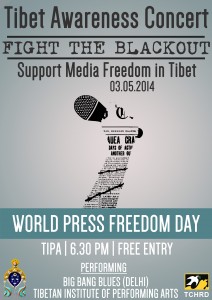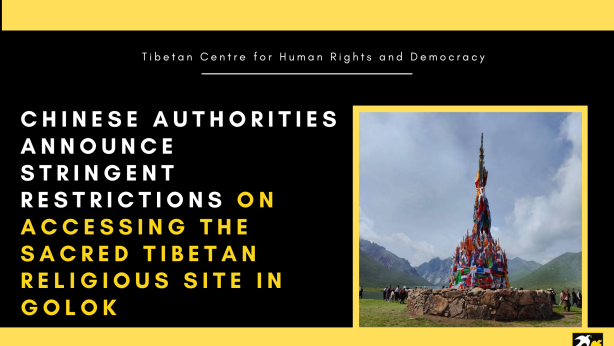FIGHT THE BLACKOUT IN TIBET: World Press Freedom Day Campaign
 ‘Fight the Blackout’ campaign aims to highlight and end the extreme restrictions put on independent journalists and human rights monitors to visit and assess the ground situation in Tibet as Tibetans continue to self-immolate in protest and become victims of human rights abuses.
‘Fight the Blackout’ campaign aims to highlight and end the extreme restrictions put on independent journalists and human rights monitors to visit and assess the ground situation in Tibet as Tibetans continue to self-immolate in protest and become victims of human rights abuses.
An initiative of Tibetan Centre for Human Rights and Democracy (TCHRD), ‘Fight the Blackout’ campaign has been active online mobilizing support from the civil society including individuals and groups and reminding the larger humanity about the significance of the World Press Freedom Day, observed globally every year on 3 May, a day for governments to remember their duty to uphold the right to freedom of expression, a fundamental human right; a day to assess the state of press freedom throughout the world and to pay tribute to journalists who have lost their lives in the line of duty; and a day to remember the restrictions imposed upon press freedom throughout the world, including in Tibet.
The campaign will culminate in a Tibet Awareness Concert at 6.30 pm onwards on 3 May 2014 at the Tibetan Institute of Performing Arts (TIPA) in the exile Tibetan capital in Mcleod Ganj, Dharamsala. A Delhi-based blues inspired band, Big Bang Blues, will headline the concert, as this music genre echoes commitment and determination to speak out against hardship, oppression and injustice. Taking their spirit from the birth of blues, Big Bang Blues has a powerful, unique and inspiring style. Our campaign partner, TIPA, will present contemporary Tibetan performances along with a host of other solo artists.
China has imposed an information blackout on Tibet, which places heavy restrictions upon the freedom of press and expression. China prevents the international community from knowing the real situation in Tibet by strictly controlling the movements of foreign and domestic journalists including Tibetan citizen journalists who are imprisoned and tortured for their efforts to share information about human rights abuses. Tibetan voices are silenced, their agency violently denied as independent publications are banned or heavily censored. In 2013, Chinese diplomats harassed and threatened Cyril Payen, a correspondent for France 24, a French TV news station for filming an undercover report on Tibet in May last year.
Despite China’s statements that foreign journalists are free to travel anywhere in China, Tibetan areas remain a special case, particularly in the wake of the spring 2008 unrest. The Reporting Guide of the Foreign Correspondents Club in China (FCCC) lists Tibet as the most sensitive topic to cover, exposing one to increased risk of interference by officials or police and surveillance. In May 2013, a survey done by FCCC revealed the obvious: that reporting conditions for foreign journalists in China have worsened considerably with an overwhelming number of journalists reporting increased harassment, intimidation, physical attacks and detention at the hands of state-sponsored thugs.
China is among the top 3 of the world’s leading jailers of journalists. It was also the worst jailer of journalists in the world for a record 10 years from 2000-2010. In 2013, a big majority of the 32 known journalists jailed in China were Tibetan, imprisoned for documenting tensions that escalated since 2008.
Since 2009, TCHRD has confirmed a total of 131 self-immolation protests in Tibet, yet information about these or other protests has become difficult to emerge in the international community, and the Tibetans who take risks to get the information out of Tibet continue to get tortured and jailed on trumped-up charges of ‘endangering national security’ or ‘leaking state secrets’.
The 2014 World Press Freedom Index released by Reporters Without Borders has ranked China at 175th out of 180 countries, making China one of the world’s top five violators of the right to freedom of information and expression particularly press freedom. As soon as Reporters Without Borders released its 2014 World Press Freedom Index, the Chinese Communist Party’s propaganda department issued a directive banning its publication and dissemination.
The information blackout must stop. Tibet must be opened to foreign journalists and independent monitors to assess the reality of the situation in Tibet. In light of increased repression and self-immolation protests, this needs to be done immediately.
Press freedom is essential for the exercise of freedom of expression. A free press encourages good governance, sustainable development, and transparency in decision-making, ensures leaders are accountable and exposes corruption.
For more information, visit our campaign page on Facebook https://www.facebook.com/pages/FIGHT-THE-BLACKOUT/671126992953729


